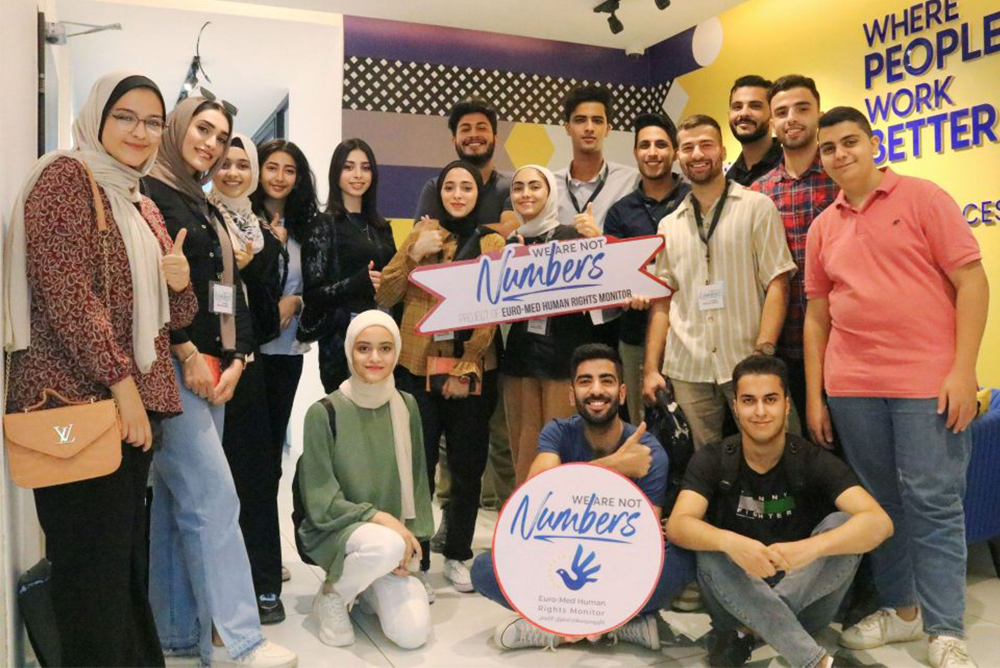
Teaching artist Sarah Jacobus mentors young writers in Gaza. These days she leaves her ringer on overnight, just in case one of them reaches out. The 18th, and most recent, cohort of the Gaza-based, youth-led program We Are Not Numbers. Courtesy of author.
Mustafa was one of the first young writers I mentored through We Are Not Numbers (WANN), a youth-led program based in Gaza that tells the stories behind the numbers in the news, giving voice to Palestinians and advocating for their human rights. Mustafa is a graduate of Al Aqsa University, and he managed a small convenience store to supplement his family’s income.
Two years ago, I worked with him—virtually, from my home in Los Angeles—as he drafted and refined an essay about 13-year-old Muhammad, a familiar figure in his Khan Yunis neighborhood, who was bullied at school and compelled by extreme poverty to scavenge for castoff bread in the streets. In offering Muhammad odd jobs at the convenience store and extending his friendship, Mustafa awakened a sense of self-esteem in the boy. Through a series of Zoom meetings and Google Doc exchanges, we generated multiple drafts of the essay. And though Mustafa struggled with English, his piece displayed the rich detail and authentic dialogue of a born storyteller. One day, he logged on to Zoom on his phone from the store so that Muhammad and I could “meet.”
Mustafa married this year. In the aftermath of October 7, his wife’s family home in Gaza City was bombed, and the couple has been on the run since. “We are in our fifth place,” he texted me on WhatsApp, “but there is no safe place in Gaza. My wife is pregnant in her seventh month, and she is sick. She cannot get medical care.” My most recent messages to Mustafa have gone unanswered.
Since October 7, I’ve hovered over WhatsApp for messages not only from Mustafa but also from other young writers in Gaza I’ve mentored over the past several years. I leave my ringer on overnight, something I never did before, to seize the rare moments of internet connection and respond right away, even in the wee hours. I stare at the phone, hoping those single check marks will go double, offering me at least the assurance that my message has been seen, even if the writer is unable to respond.
Right now, all the stories published at WANN are about Israel’s current “aggression,” as our writers call it. They have lived through at least five aggressions in their 20-odd years. When the bombs aren’t falling, WANN writers have written essays about the World Cup, the “Hummus Theory,” a foodie blog of modernized Palestinian recipes, the soothing power of the sea, and aspirations to forge meaningful lives in a place where opportunity is scarce and danger abounds, even in the best of times.
Walaa, once a teaching assistant in English literature at the Islamic University of Gaza (IUG), wrote a cogent essay for WANN that drew parallels between the tragedy of Othello and the occupation of Palestine. Last year, she was one of only two students from Gaza to receive the British Council’s Higher Education Scholarships for Palestine, enabling her to enter a master’s degree program at the University of Birmingham. She started her studies in September 2022 and planned to return to a faculty position at IUG in early 2024. The university was destroyed in an October 11 bombing, and she is now stranded far away. “This is putting more uncertainty on me now, because I’ve lost a job,” she texted me. “But it’s 25,000 students who’ve lost their education, meaning even more unemployment.”
My current mentee, Roaa, is a college student from Khan Yunis with a passion for physics. In a fiction story she completed just before October 7, a young woman enjoying life in a free Palestine and another witnessing the rubble of her Gaza home after an Israeli airstrike experience glimpses of the other’s reality by means of quantum entanglement. “It’s mind-blowing!” Roaa enthused on Zoom as we worked on her story. “It literally states that when two particles become entangled, changes in one particle’s state instantaneously affect the other, no matter the distance separating them.”
Roaa spent her first sleepless night during recent bombings writing about what was happening. She said it helped her get through the night. In more recent messages, she has reported that she and her family “had to evacuate our house twice in the past few days,” and that she’s been writing about that, too.
Other messages from writers tell of homes destroyed, and friends and relatives missing or dead. Four WANN writers have been killed in bombings since the “aggression” began, losses that have left this creative community reeling.
Yet amid the devastation, WANNers, as they call themselves, continue to create. When I asked Roaa what she would want readers to know about WANN, she texted, “The main aim is that each soul in Gaza is a whole life, dreams, and memories, not only a number. As long as we are alive, we will never stop sharing our stories with the world.”
These are voices we need to hear, to deepen our understanding of the lived experience of Palestinians in Gaza and gain insight into their yearning for freedom. Only a full and permanent ceasefire will ensure that they are not silenced altogether.




Send A Letter To the Editors